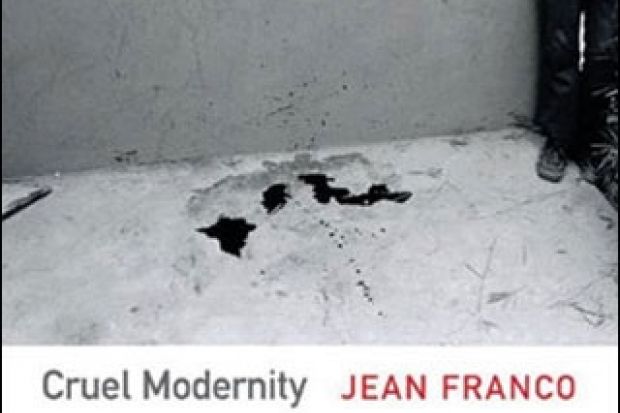In Jonathan Littell’s controversial novel Les Bienveillantes (in English, The Kindly Ones), a former SS officer who had played an active part in the Holocaust reflects: “There was a lot of talk, after the war, in trying to explain what happened, about inhumanity. But I am sorry, there is no such thing as inhumanity. There is only humanity and more humanity.”
Is he correct? Is the urge to commit acts of spectacular cruelty latent in what it means to be human?
Jean Franco has a reputation for her incisive, eloquent reflections on such world-shattering questions. This book does not disappoint.
Franco wants to be optimistic about humanity, but she is too honest: all she can manage is the claim that she is “reluctant to think we are all potential killers”. Her hesitation is understandable. In Cruel Modernity, she turns her acute intellect to the problem of extreme violence in Latin America. State violence, military violence, revolutionary violence: these are all dissected and contextualised. Under what conditions is cruelty possible? To what extent does it require the complicity of governments or other powerful institutions? Are the innumerable atrocities that have taken place in Latin America over the past 80 years distinctive in some way from those that took place earlier or in Europe? She observes the ease by which certain people are dehumanised. Most importantly, she returns time and again to the pointlessness of the cruelty. Why is it necessary to carry out elaborate, almost carnivalesque, acts of torture rather than a swift slaughter?
Franco’s book tells a chilling story. Harrowing is probably the best word to describe this book.
In some context, manliness and savagery have been inextricably entwined. This was one of the conclusions of the Guatemalan Commission for Historical Clarification, which was set up in 1996 to investigate violence committed against indigenous peoples. With meticulous precision, they documented many “outrageous acts”. There were numerous acts of cannibalism, for instance, in which “aggressors ate the viscera of victims or forced the victims to drink their own blood”, or even to eat their own ears or penises. In this way, not only were victims forced to act according to the prejudices of the military – in other words, as savage cannibals – but soldiers were required to become savages by having cannibalism incorporated into their military training regimes.
Even survival can be a kind of death. In the words of the Chilean novelist Diamela Eltit, people who survived the executions “were assassinated but nevertheless went on living”. Ideas of justice or recompense are hollow abstractions that can do nothing to alleviate, let alone erase, memories of the horror. Nightmares, insomnia, fits of vomiting and a deep distrust of other people may last a lifetime. Many victims find themselves rejected by their own communities. Raped women (the vast majority of whom were indigenous) were abandoned by their husbands, ostracised by their families and discriminated against by their communities. By being “used” or “wasted”, they had tarnished not simply their own honour but the social bond itself. Like those millions of men, women and children who were picked up on the street or even from their homes, bundled into unmarked cars and “disappeared”, these women were expected to simply vanish.
Franco concludes her bleak book by reminding us that the atrocities she has been documenting cannot be relegated to “history”: they continue to resonate in Latin American societies today. The past always infiltrates the present.
She warns against making the crimes “unspeakable”, noting that this risks transforming them into something “mystical, outside the bounds of political action”. There can be no end to atrocities without removing gross economic and social inequalities. It is one thing to propose the establishment of more truth and reconciliation commissions; quite another thing to remove hatreds and divisions that are deeply embedded in a nation’s history. Glumly, she finishes her book with the observation that scholars can play only a very limited role in forging more just worlds. “However profound the impression left on [us] by the testimonies,” she states, we are “still at a distance and free to be in some other place”. It is a disheartening message.
Cruel Modernity
By Jean Franco
Duke University Press, 296pp, £70.00 and £16.99
ISBN 9780822354420 and 54567
Published 25 June 2013
Register to continue
Why register?
- Registration is free and only takes a moment
- Once registered, you can read 3 articles a month
- Sign up for our newsletter
Subscribe
Or subscribe for unlimited access to:
- Unlimited access to news, views, insights & reviews
- Digital editions
- Digital access to THE’s university and college rankings analysis
Already registered or a current subscriber?




